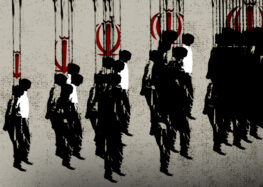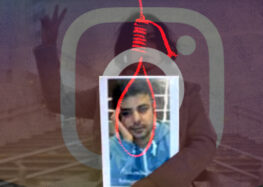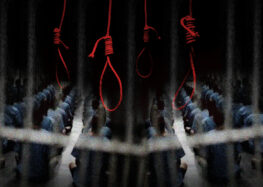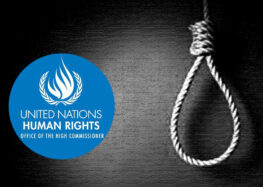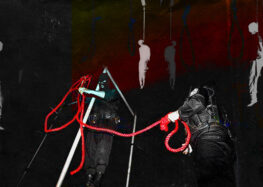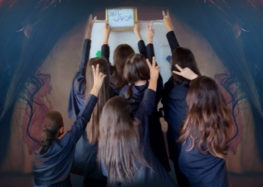“His Last Wish Was To Embrace Me, But They Didn’t Allow It,” Says Mother Of Executed Inmates
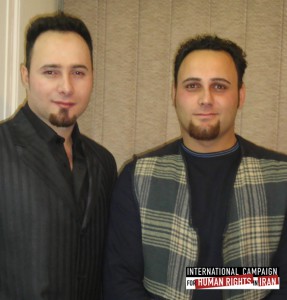 On 17 May the death sentences of two brothers, Mohammad and Abdollah Fathi Shoorbariki, were carried out. Their mother, Mahvash Alasvandi, told the International Campaign for Human Rights in Iran that her children’s grievances were never reviewed and their last wishes of embracing their mother were not granted. “All we said was that their complaints be reviewed before executing them. We said what is the rush? They are in your hands and they are not going anywhere. You have held them for nine months. Review their complaint first and then execute them. But unfortunately they didn’t do this.” (Audio file of the complete interview with mother of Fathi brothers)
On 17 May the death sentences of two brothers, Mohammad and Abdollah Fathi Shoorbariki, were carried out. Their mother, Mahvash Alasvandi, told the International Campaign for Human Rights in Iran that her children’s grievances were never reviewed and their last wishes of embracing their mother were not granted. “All we said was that their complaints be reviewed before executing them. We said what is the rush? They are in your hands and they are not going anywhere. You have held them for nine months. Review their complaint first and then execute them. But unfortunately they didn’t do this.” (Audio file of the complete interview with mother of Fathi brothers)
Abdollah and Mohammad Fathi Shoorbariki were arrested along with five others last March on charges of armed robbery from Karaj jewelry stores. Branch 4 of the Isfahan Revolutionary Court issued their death sentence, and it was upheld during the appeal process.
In a March 1 letter addressed to the Isfahan Military Court, Abdollah Fathi filed a grievance against individuals he called “my torturers,” naming Colonel Hosseinzadeh, Isfahan Police Chief, Major Ghodratollah Rahimi, Lieutenant Bahrami, and several other military personnel, claiming he had been tortured by flogging, severe beating, and being threatened with rape. A day later, he wrote a letter to the Judges’ Court, filing a grievance against Judge Moghtazi, Mohammad Reza Habibi,the Deputy Prosecutor of Isfahan, and Investigative Judge Najafi, of Branch 10 of the Isfahan Court, claiming that they did not follow due process in his and his brother’s cases and did not take note of their grievances.
“Their lawyer was not informed about the executions at all. Only one day before, they contacted me from the prison and said to come in tomorrow morning because we want to execute the kids, and I couldn’t believe it. This morning, after I saw my children, I asked the warden of Ward A-T and the Deputy Head Warden of the prison: ‘Are you going to finally show me the sentence document, so that I know on what verdict my kids are being executed?’ and they told me that the verdict had not yet arrived, and that the Judge still had it. I asked them ‘Will you show it to my kids?’ They said ‘Sure.’ I said ‘How would I know that you showed it to them?’ My son said: ‘Mom, don’t argue any more, it’s useless,'” said Alasvandi.
“We were in front of the prison at 4:00 a.m. There was a large crowd outside the prison, too. We kept knocking on the door, but they wouldn’t open it. They said that they will open the door right at 6:00 a.m. After I entered and they conducted a body search, I entered the prison courtyard where everyone had gathered, the prison authorities and 30 to 40 armed soldiers. They spread a blanket on the ground and told me to sit down until they brought the kids. They brought them out one at a time, and Abdollah came first.”
“I heard that the convict’s last wishes are asked just before execution and then the execution is carried out. But when my son said ‘Untie my hands so that I can embrace my mother,’ they said ‘The law doesn’t allow us to do this.’ I said ‘Sweetheart, you know that everything is according to law here and this place is full of law-abiding individuals. It’s O.K., I will embrace you.’ But it was hard for me to see that my son’s last wish which was embracing me was not carried out,” continued Alasvandi.
“I still don’t know whether my sons’ charge was moharebeh (enmity against God) or robbery. I don’t believe they were at war with the regime or with God,” the executed brothers’ father, Bijan Fathi, told the Campaign. Referring to his and his brother-in-law’s political activism, he said that during his sons’ interrogations, they were accused of connections to their uncle who was previously sentenced to death (and later pardoned) during the 1980’s mass executions; the uncle now lives abroad.

